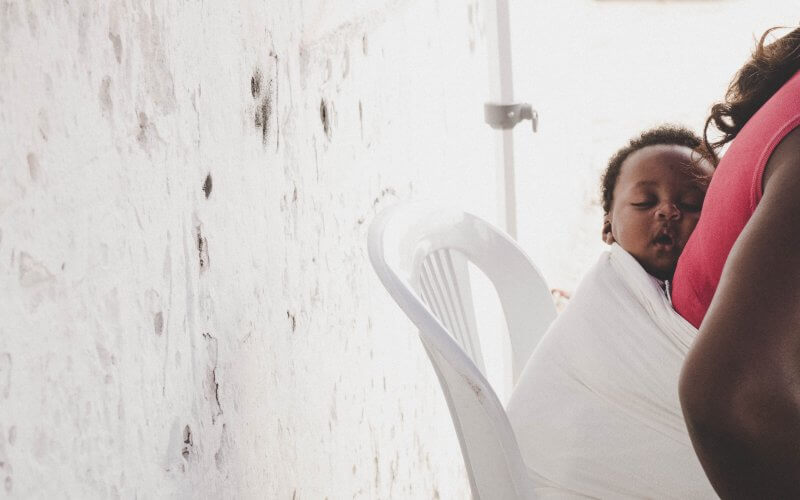5 ways to get baby to sleep

ThOne of the hallmarks of having a newborn in the house is sleeplessness. And nothing is better than that first night of uninterrupted sleep, as your child finally sleeps through the entire night. We’ll help you get there, with our top 5 ways to get baby to sleep.
Even infants thrive on a basic routine. It can be hard for new babies to acclimate to the world outside of the womb. They have no idea what this outside world is all about.
In fact, much to a new parents exasperation, a lot of babies suffer from day-night confusion. They have yet to develop their circadian rhythms. Alanna McGinn, a certified pediatric sleep consultant, states “These clocks drive our circadian rhythms and create an internal timing mechanism that makes us more awake during the day and more tired at night. Parents tend to have unrealistic expectations that a newborn baby can adjust to their new world too quickly, after spending nine months in relative darkness. They’re just not developmentally ready.”
To help ease them out of the confusion, you need to give them cues that it is time for bed and a quiet sleeping environment.
1. Start a nighttime routine

The earlier you can start a routine with your child, the better. However, it is never too late to start. Here’s a few basic pointers to get you started:
- Start about 20–30 minutes before you want them in bed.
- For infants, a routine can be as simple as a bath, a swaddle and the same “night-night” song
(As your child gets older routines can become more complex and include cleaning up and brushing teeth). - Avoid stimulating activities, sugar or big meals right before bedtime.
- Try to always read a soothing bedtime story (Goodnight Moon and Pat the Bunny are some great classics to start with).
- Set a special alarm to let them know it’s time to start the routine (you can even snooze it once for five minutes if they’re being good).
- Prepare the perfect sleeping environment.

2. Create a sleep-friendly environment
Now we’ve looked at a routine full of ways to get baby to sleep, we’re going to touch on where baby sleeps. As we know, where you sleep is very important. Babies are used to being in the womb with the sound of amniotic fluid and heartbeats. That’s why a sound machine is a great addition to their room. White noise, ocean sounds or even stuffed animals with heartbeats help soothe babies to sleep.
More than just being soothing, according to the Sleep Foundation, incorporating white noise will also block out ambient noise from the rest of the house. Babies and young children sleep a lot. There will often be other activities in the house while they are napping or sleeping at night. Blocking out that noise helps babies sleep faster and for longer (source).
Also, blackout curtains work wonders in young children’s rooms, especially in the summertime. It’s hard to convince your child to start going to bed when the sun is still shining brightly. However, starting the nighttime routine and then ending in a bedroom with dim lights and no sun shining through the window undoubtedly helps. It also helps them sleep longer in the morning (something every parent wants).
3. Allow them to self soothe
One of the hardest things for parents to do is to allow their children to self-soothe at night time. However, it is one of the most important tools and ways to get baby to sleep. Avoid trying rocking them all the way to sleep, instead, lay them down just before they nod off. Because if they wake up in the middle of the night they may cry out to be rocked to sleep again.
In Sleeping Through the Night: A Developmental Perspective, Anders et al, stated “Babies that have this skill of self-soothing have been shown to get a full additional hour of sleep during their longest nighttime sleep period and an average of 45 additional minutes of total nighttime sleep. They wake during the night just as non-self-soothers do, but they are less likely to cry out for help and more likely to roll over and go back to sleep”
If you already have been doing this, try to gradually stop the rocking and singing to sleep. It can end up being a quite problematic condition called Sleep Onset Association Disorder. This makes it very difficult for a child to fall back asleep without their parent hugging or cooing to them. If your child calls for you after you leave, wait a few minutes before responding. This can help remind them that it’s time for sleep.

4. Provide tools to fight fears
The ways to get baby to sleep change as your child grows. Along the way you’ll end up finding new kinks and problems at bedtime. Your child becomes more aware of the difference of night and day, being alone, as well as becoming aware of fears. Help them get over their fears with tools to help them feel in control.
A secure light up toy can help them fight a fear of the dark. Just make sure it’s not an ordinary flashlight that they can unscrew. Batteries, springs and light bulbs could be choking hazards. Also, “Monster Spray” is a great tool for kids. Get a small water bottle, put a NO MONSTER label on it and let your child spray under the bed and in the closet. Leave the bottle with them in case they are frightened by any bumps in the night.
5. Rewards babies for Staying in Bed
Lastly, a previously angelic sleeping baby can quickly turn into a feisty tantrum-throwing toddler. Keeping a behavior chart will really help give them incentives for staying in bed at night time. Each night they go to bed on time without a fuss and stay in bed, they get a gold star. After they get a certain number of stars they get a special reward. Operant conditioning or positive reinforcement is usually a good tool in helping children learn what behavior is acceptable and what behavior is not.
Ways to get baby to sleep: A final word
All these ways to get baby to sleep are very important. Giving your little one the tools they need to sleep independently is one of the best things a parent can do. A lack of sleep can cause a host of behavior and attention problems that can follow them for years. Plus, when they aren’t sleeping well, you’re not sleeping well either. And we all need a good night’s sleep to function at our best.
Discover your sleeper profile with this sleep test
Start



